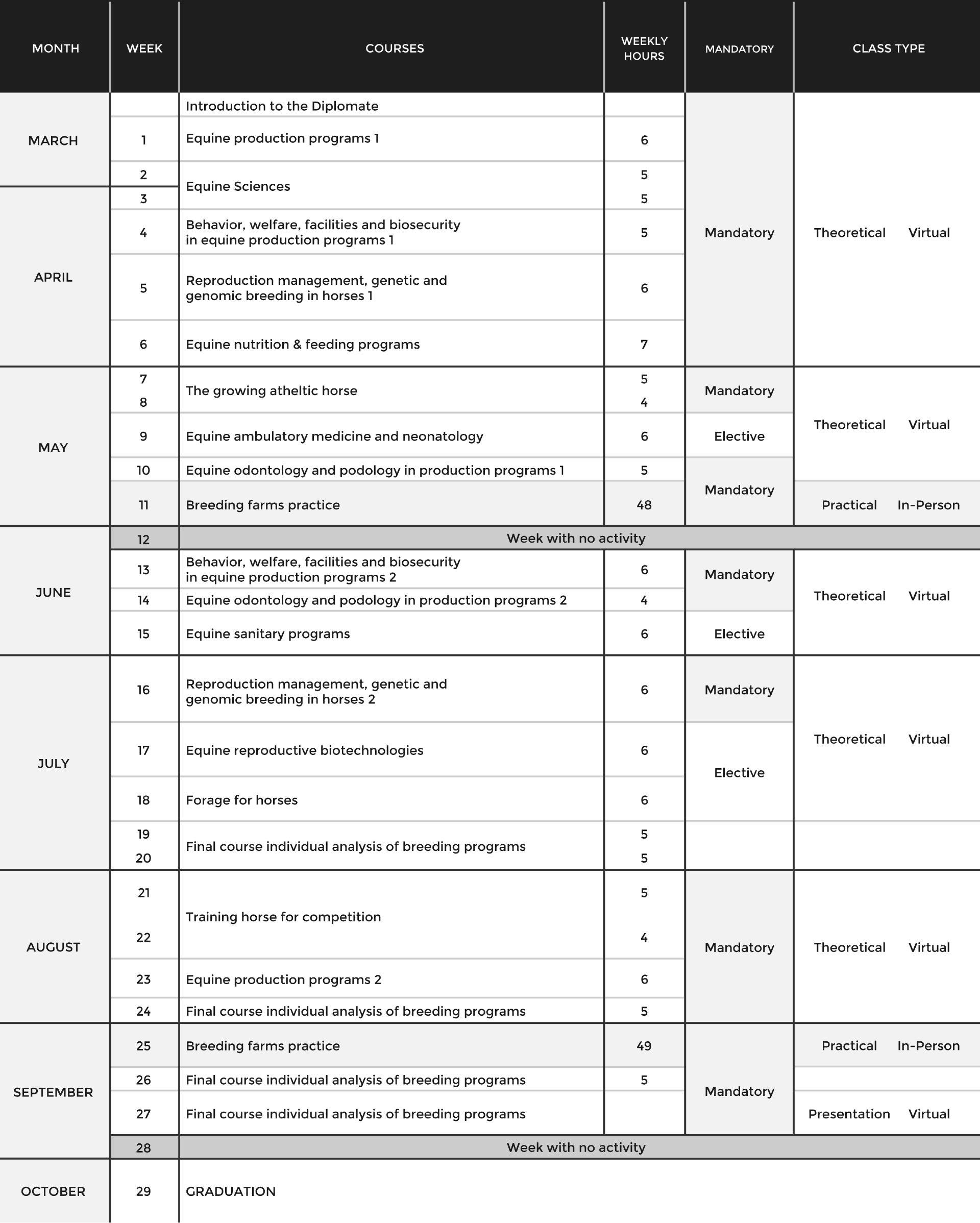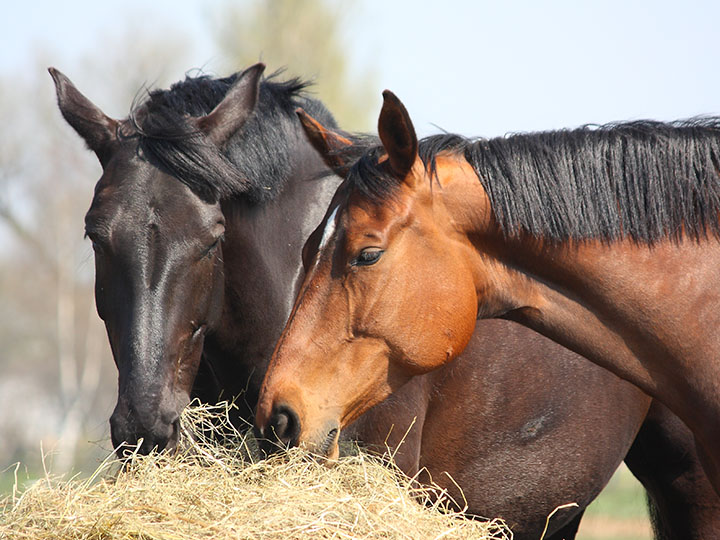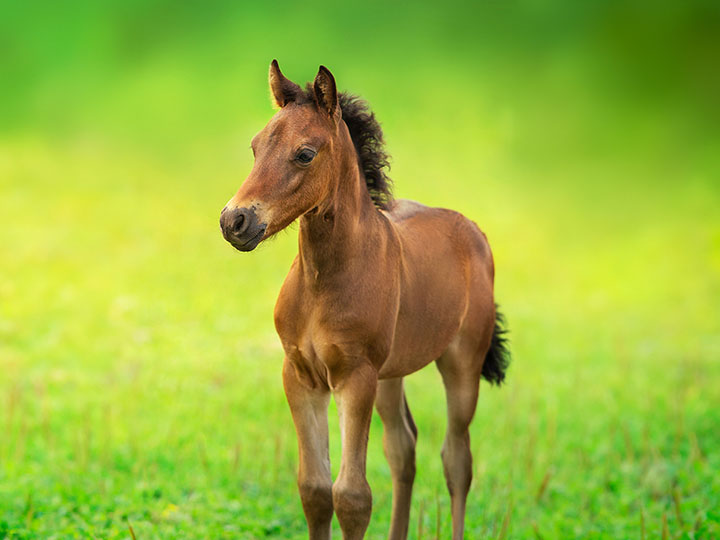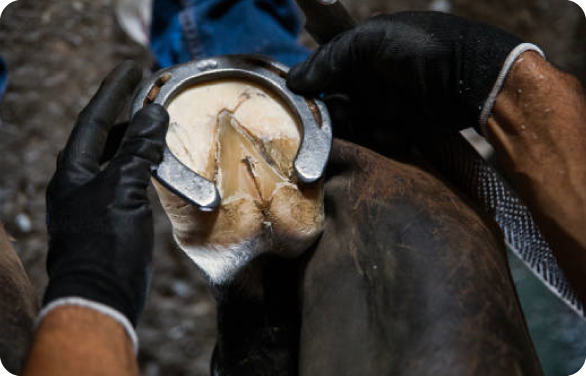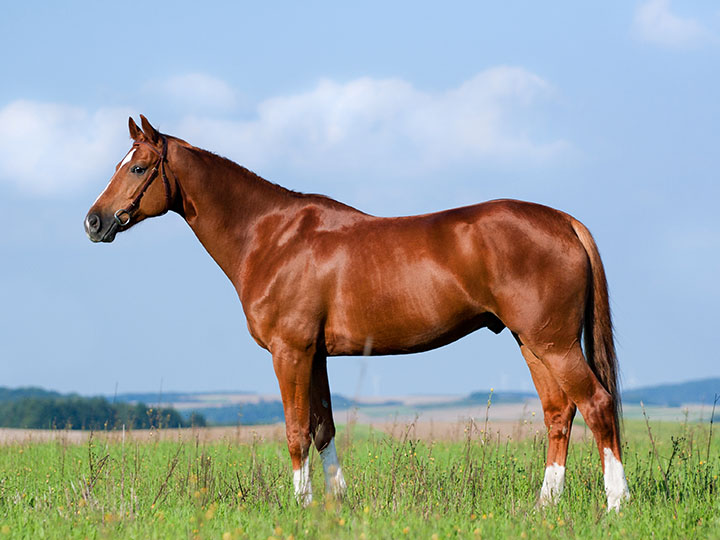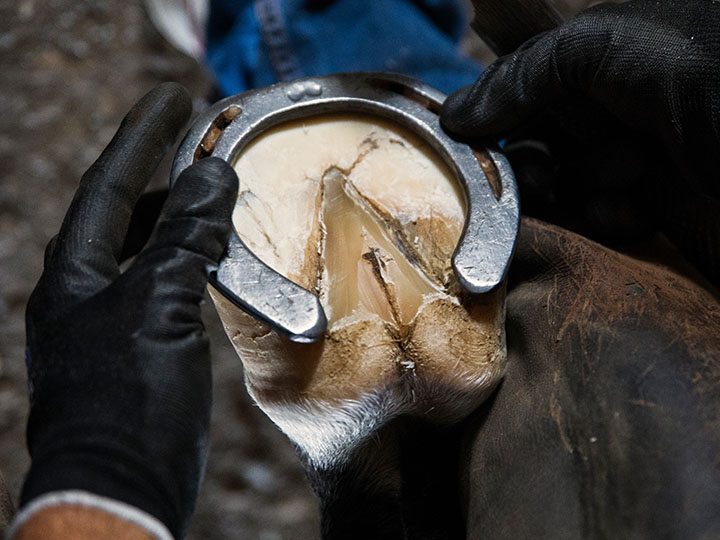International Equine
Production Diplomate
Be part of a unique training experience in Latin America!
Date: march 2024
Estimated time: 220 hours
Duration: 8 months
Language: Spanish
Modality: virtual (theoretical) and face-to-face (hands-on)
Staff of professors
Agustín Ruiz
DVM, MSc, Dip ACT
Gouburn Valley Equine Hospital, Australia
Amy McLean
DVM, PhD
University of California-Davis, USA
André Galvão de Campos Cintra
DVM, MSc
Independent consultant, Brazil
Andres Gambini
DVM, PhD
University of Queensland, Australia
Ariel Pellegrini
Ing Zoot, MSc
Independent consultant, Argentina
Benjamin Uberti
DVM, MSc, Dip ACVIM
Qatar Equine Hospital, Qatar
Brian D. Nielsen
PhD, PAS, Dpl. ACAN
Michigan State University, USA
Carolina Alonso
DVM, MSc
Universidad Nacional de Río Cuarto, Argentina
Carolina Duran
DVM, MSc, PhD, Dip ACVIM
Universidad Austral, Chile
Carolina Herrera
Lic en Biol, MSc
Paladis GmbH, Switzerland
Catalina Castañeira
DVM, PhD
Universidad Nacional de Río Cuarto, Argentina
Celina Checura
DVM, MS, PhD, DACT
Clemson University, USA
Cristian A. Castillo Franz
DVM, PhD
Corporación Universitaria Unilasallista, Colombia
Eduardo Frank
DVM, PhD
Universidad Católica de Córdoba, Argentina
Emmeline Hill
DVM, PhD
University College Dublin, Ireland
Federico Oyuela
DVM
Escuela Argentina de Herradores, Argentina
Fernando Riera
DVM
Doña Pilar embriones, Argentina
Gabriel Vichera
Lic Biotec, PhD
Kheiron Biotech, Argentina
Hans Castelijns
DVM, Herrador diplomado
Independent consultant, Italy
Juan Cuervo-Arango Lencina
DVM, MSc, PhD, Dip ECAR
Universidad CEU Cardenal Herrera, Spain
Lucas Nolazco Sassot
DVM, MSc, Dipl ACVS-LA
Newcastle Equine Centre, Australia
Macarena Sanz
DVM, MSc, PhD, Dip ACVIM
Washington State University, USA
Marcelo Sperati
DVM
Ellerstina Polo Team, Argentina
Martín Hardoy
Independent consultant, Junín, Argentina
Mauro Bottini
Ing Agr
Independent consultant, Córdoba, Argentina
Melina Pietrani
DVM, MSc
Universidad Nacional de Villa María, Argentina
María Aldana Vissani
DVM, PhD
INTA Castelar, Argentina
María José Sánchez-Guerrero
DVM, MSc
Universidad de Sevilla, Spain
María Mercedes Valera Córdoba
DVM, PhD
Universidad de Sevilla, Spain
Mariano Hernández Gil
DVM Zoot, MSc
Universidad Nacional Autónoma de México, Mexico
Pablo Trigo
DVM, MSc, PhD
Universidad Nacional de La Plata, Argentina
Patricia Harris
MA PhD Dip ECVCN VetMB MRCVS
Independent consultant, UK
Patrick McCue
DVM, PSc, PhD, Dip ACT
Colorado State University, USA
Paul D. Siciliano
DVM, PhD
NC State University, USA
Ramiro Toribio
DVM, MSc, PhD, Dip ACVIM
Ohio State University, USA
Santiago Losinno
DVM, MSc
Universidad Nacional de Río Cuarto, Argentina
Sebastián Alejandro Greco
DVM
Universidad Nacional de Buenos Aires, Argentina
Sebastián Demyda-Peyrás
Ing Zoot, PhD
Universidad de Córdoba, Spain
Sergio Giliberti
DVM, MSc
Independent consultant, Cardales, Argentina
Sergio Paz
Ing Zoot, MSc
Universidad Nacional de Lomas de Zamora, Argentina
Siobhan McAuliffe
MVB DACVIM Cert RA
Independent consultant, Ireland
Tamara Tadich Gallo
DVM, MSc, PhD
Universidad Austral, Chile
What do we propose?
E-quine Academy and its partner institutions offer a postgraduate Higher Diploma program with a strong professional focus, designed to enhance training in various aspects of international equine production.
This program combines both in-person and virtual learning modalities, providing the flexibility to study and gain expertise in a specific area of knowledge from anywhere in the world. The curriculum is designed to be compatible with your daily professional responsibilities.
The course covers critical aspects of equine production, including the design and analysis of production systems, facility design and management, biosecurity and welfare standards, forage production and management for equines, feeding and nutrition for different categories, the fundamentals and practical applications of training programs, genetic and environmental factors affecting behavior, basic and essential procedures in ambulatory medicine and neonatology, reproductive management, genetic improvement programs, and the use of reproductive biotechnologies.
One of the program’s greatest strengths lies in its faculty and the connection between theory and practice. More than 60 professors from 11 countries will share their experience and knowledge through specialized and timely classes that address key aspects of equine production. Live online consultations and discussions are available for additional support. The program’s theoretical component (50% of the course) will be delivered online, while the practical component (50% of the course) will take place on farms and within real production systems, encompassing various scales and horse breeds in Argentina.
Subscribe to receive updates about the diplomate course!
Curricular structure
(Preliminary schedule subjected to modifications)
Frequently Asked Questions
- e-quine Academy
- Facultad de Ciencias Agropecuarias de Unilasallista Corporación Universitaria, Medellín, Colombia
- Facultad de Ciencias Agrarias, Universidad Nacional de Lomas de Zamora
- Fundación Argentina de Veterinaria Equina




1. Generate a program for the transfer of knowledge, experiences, procedures and technologies that provide training in the area of Equine Production labor competence.
2. To offer a formal and controlled training based on a map of competencies, skills and knowledge that will allow to exercise the professional activity in a more competent, active, critical and suitable way in the production and industry of horses.
Develop knowledge and skills to:
1. contribute to preserve animal health and welfare through the application of management methods and procedures coming from empirical knowledge generated from dozens of years of practice and also scientific/technological knowledge coming from formal systems of knowledge generation on the multiple areas of equine production.
2. Adequately manage reproductive management programs and application of assisted reproduction techniques.
3. Design, manage and control the different phases of equine breeding, care, dressage and training.
4. Design and plan adequate equine facilities and biosecurity programs.
5. Properly manage feeding and nutrition in pastoral and confinement systems.
6. Identify and be able to analyze the bases and applications of genetic improvement programs.
7. Improve the environmental performance of the farm through sustainable and environmentally friendly practices, such as waste management and efficient use of resources.
8. Manage the operation and performance of a company that breeds and/or cares for equines.
9. Adequately transmit information and work collaboratively with other professionals and people or teams involved in the care and management of equines.
To professional Veterinary Doctors, Animal Husbandry Engineers and Agricultural Engineers, ideally with work experience in equines, who wish to deepen and update their knowledge in the area of equine production.
The course load will be 220 hours, equivalent to 11 credits (20 hours per credit) distributed in 25 weeks, with an average weekly load of 4.5 hours (not including practical modules).
The course is scheduled to begin on March 15, 2024 and to end on October 1 of the same year. These dates are preliminary and indicative and are subject to minimum changes.
March 2024
October 2024
Sequential steps for registration for the diploma course:
1. PRE-REGISTRATION: November 1 to 30, 2023.
It consists of completing the application form and sending all the required documentation digitally. It includes a personal interview via internet.
A fee of USD 200.- must be paid at this stage.
2. NOTIFICATION: December 1 to 7, 2023
You will be notified via e-mail only if your application has been accepted.
3. REGISTRATION: December 10 to 20, 2023
Only if you have received the confirmation, you have 10 days to make the payment through the established means of payment.
You will be automatically notified of the accreditation of the amount and the consequent confirmation of the registration. Otherwise, the registration will be cancelled and the person on the waiting list in the order registered will have access to the application.
Registration is only accepted by entering the Equine Academy platform (e-quine.net) and following the steps indicated in the registration form (coming soon).
IMPORTANT: Places are filled strictly in the order of pre-registration. The system automatically blocks registrations when the established quota is filled.
The amounts deposited are not refundable if for any reason the applicant decides not to attend or to drop out of the course.
- The total value will be USD 4,500.
- Sequence of payments:
- USD 200 at the time of pre-registration (01/11 to 30/11, 2023).
- USD 1,300 at the time of registration (10/12 to 20/12, 2023)
- USD 1,500 before the start of the first module (03/01 to 03/15, 2024)
- USD 1,500 before the start of the second module (06/01 to 06/10, 2024)
Those who have obtained a university degree in Veterinary Medicine, Animal Husbandry Engineering, Agricultural Engineering or their equivalents may apply for this Higher Diploma. Those interested must submit the following documentation:
Copy of the degree certificate (it is not necessary to be legalized).
Presentation note indicating the interest in pursuing the diploma course, including a brief description of your area of work.
Updated Curriculum Vitae (no more than 5 pages).
Digital copy of a signed copy of the Diploma Regulations (which can be downloaded from this site) as proof of notification and acceptance of the rules and conditions of the course and approval.
There is a quota of 25 people for the diploma course.
- The modality will be semipresential.
- The Diploma will be established in an integral way around curricular axes, with their equivalence in hours for courses, seminars, internships and final work.
- The diploma will have a semi-flexible curriculum and will have compulsory and elective courses, which will be given only once per cohort.
- Students must take a total of 200 hours of courses. Of these, 160 hours will correspond to required courses and 40 hours to elective courses.
- The courses will have a theoretical and a practical part and will be grouped in two thematic modules.
- The theoretical and theoretical/practical classes will be taught 100% virtually. Some will be given in real time (online -synchronous-) and others in offline format (previously recorded classes -asynchronous-). Those given in real time will be recorded and will remain available on the platform for the duration of the diploma course.
- Upon completion of the theoretical and theoretical/practical classes and after passing the partial evaluations of each module, the practical part will be given 100% face-to-face. It will be carried out in two instances of 5 consecutive intensive days each. They will include visits to different production systems, hospitals and laboratories, as well as the application of techniques and procedures on animals. The practices of all the theoretical courses taken in the previous module will be carried out in these 5 consecutive intensive days (50 hours).
- Teachers will be able to select the support material they consider relevant for their classes. This content will be uploaded to the platform and will be shared with the students of the course.
- On the digital platform, a system for virtual consultation will be made available to students in live and offline mode, to allow students to resolve doubts or concerns.
All courses will have complementary material, both bibliographic and video interviews (podcast) with professionals in topics related to the module, but basically the results of personal experiences.
The means of communication between the coordination of the diploma course and the students will be through the Equine Academy platform (e-quine.net). It will offer both theoretical and consultation classes as well as support and complementary material.
The practical classes will take place in different farms located in the area of San Antonio de Areco, Argentina. They will include visits to different production systems (intensive, semi-intensive, exclusive, mixed, of different breeds and scales), hospitals and laboratories, as well as the application of techniques and procedures on animals.
During the 5 days of practice, all members of the course will travel for the visits (at least two farms per day) only in a vehicle provided by Equine Academy, for exclusive use and with the required insurance.
The arrival to the town of San Antonio de Areco, located 113 km from the city of Buenos Aires, Argentina, on the date and time set for the beginning of the practices will be the responsibility and at the expense of each person taking the course.
– Accommodation will be suggested by the organization so that, as far as possible, everyone is accommodated in the same place. Attendance must be confirmed in order to make the pertinent reservations. Lodging and meals will be paid by each person.
– The detailed program of each module will be sent to everyone by e-mail one month in advance. The dates of the practices are chosen to occur outside and within the breeding season in Argentina so that different contexts, animal categories and procedures can be analyzed.
– The material that each one of you will collect, based on a spreadsheet that will be provided, will be the basis of the final individual work necessary for the approval of the Diploma.
Courses
- All courses have an evaluation instance. Each teacher will select the evaluation modality he/she considers pertinent to measure the degree of assimilation of the contents taught.
- The evaluations of the theoretical sessions will be carried out virtually. Those related to the practical sessions, in a face-to-face environment.
- Each course will grant a certificate of approval.
Integrating final work
- The final work is individual and mandatory to fulfill the requirements of the Diploma. It consists of a work of analysis of all the real productive systems that were visited in the two practical sessions and the contents of the theoretical classes developed during the course. Each student will have a personal tutor for consultation and guidance in the preparation and presentation processes. Personal tutors will be assigned at the beginning of the course, as determined by Equine Academy. The final paper must be presented in writing and must be presented orally virtually (online) within a maximum time limit of 40 minutes.
The partial evaluations of the courses and the final integrative work will be considered approved when the grade is greater or equal to seven out of ten.
In order to obtain the degree of Diploma in Equine Production, the following must be complied with:
A minimum of 80% attendance to theoretical classes and 100% attendance to practical classes.
Approval of all the curricular spaces and the final integrated work.
Endorsement of this degree






